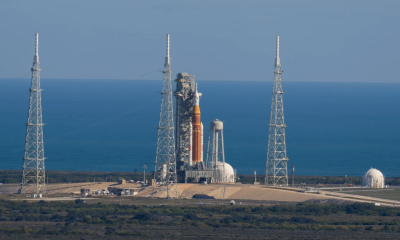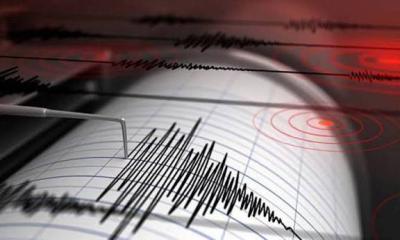Nasa's Artemis spacecraft is set to arrive at the Moon.
The Orion capsule will sweep 130km (80 miles) above the lunar surface, before entering into a larger orbit.
The vehicle will be out of contact during this manoeuvre, which will happen at 12:44 GMT, as it takes place on the far side of the Moon.
The Artemis team said they would be "waiting intently" for the signal, and so far the mission had "exceeded expectations" since last week's launch.
"It's been a really exciting few days for both the team and the spacecraft as we learn how the system operates in the deep space environment," said Nasa's Jim Geffre at a media briefing.
"It's a good reminder that this is the first time in 50 years that a human exploration spacecraft has left low Earth orbit and been sent to the Moon."
The spacecraft will zoom over the landing sites of Apollo 11, 12 and 14 as it makes the close approach. It will be out of contact for 34 minutes, but will then start to send back data and footage from the fly-by.
The Artemis mission began on Wednesday from the Kennedy Space Center in Florida, with the launch of the most powerful rocket Nasa has ever built.
It placed Orion on a path towards the Moon. The capsule has already sent back several selfies during its journey.
Because this is a test flight, no astronauts are on board this time - instead three manikins, covered in thousands of sensors, are making the journey.
"Those sensors are getting an idea of whether the environment is going to be OK for people," explained Nasa astronaut Zena Cardman.
"So there are things like radiation sensors, motion sensors, accelerometers - things that we as human payloads are going to care a lot about."
And this is important because if this flight goes well astronauts will join the next ride, first of all going into orbit around the Moon, before a third Artemis mission then takes the first woman and first person of colour down to the lunar surface.
The European Space Agency is also carefully monitoring the spacecraft. It's built Orion's service module, which provides the power and propulsion for the voyage.
Esa also has a passenger on board: Shaun the Sheep, the British stop-motion animated character. Shaun is strapped in for the journey. Nasa's mascot is Snoopy, who is floating free in the cockpit of the crew capsule.
After the close flyby, Orion will swing much further out as it begins to loop around the Moon.
On 26 November, it is set to break Apollo 13's distance record when it reaches 400,171km (248,655 miles) from Earth.
Two days later, it will have travelled more than 430,000km (270,000 miles) from our planet - the furthest a spacecraft built for humans has ever flown.
After this, the capsule will begin its journey home, back towards the Moon and then on to Earth with a scheduled splash down in the Pacific Ocean on 11 December.






-20260206050656.webp)
-20260203061855.webp)

-20260126120749.webp)



-20260217073221.webp)




-20260216115008.webp)



















